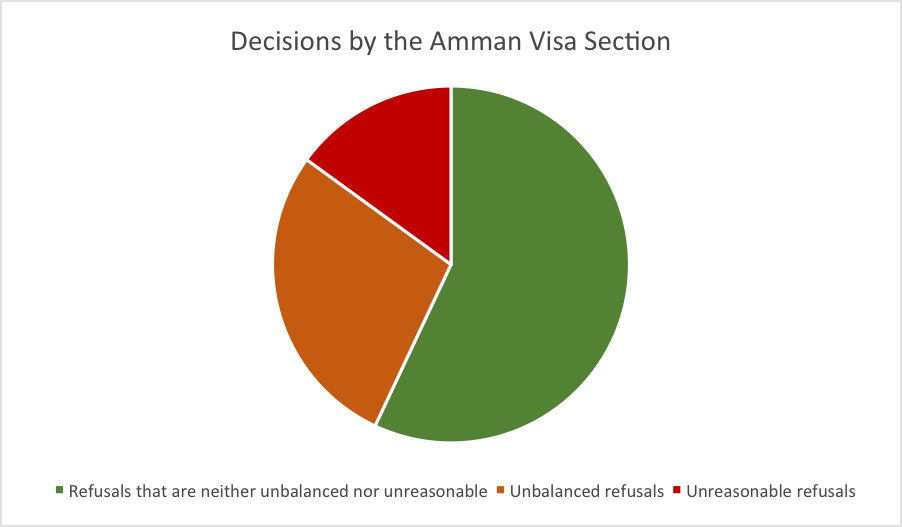- BY Paul Erdunast

ICI Inspection on Amman Visa Section: improvements made but same old problems remain
THANKS FOR READING
Older content is locked

A great deal of time and effort goes into producing the information on Free Movement, become a member of Free Movement to get unlimited access to all articles, and much, much more
TAKE FREE MOVEMENT FURTHER
By becoming a member of Free Movement, you not only support the hard-work that goes into maintaining the website, but get access to premium features;
- Single login for personal use
- FREE downloads of Free Movement ebooks
- Access to all Free Movement blog content
- Access to all our online training materials
- Access to our busy forums
- Downloadable CPD certificates
Improvements have been made to the quality of decisions and to record-keeping in the Home Office’s Visa Section in Jordan. However, the decision makers regularly failed to take supporting evidence adequately into account, and, in a fifth of cases, based their decision on incorrect facts.
The Amman Visa Section is a visa processing unit dealing with visa applications from the Middle East and Pakistan. It came under inspection in March by the Independent Chief Inspector of Borders & Immigration. The inspection only covered “Other Visitors” – that is, mainly tourist, business visitor, and short-term student visas. The full report can be found here.
Improvements made
The report is broadly positive in tone. The quality of decision making has risen since its last inspection in 2010. This is likely to be a direct result of the Home Office’s decision to recruit more staff to the Amman processing unit. Now only 11% of decisions reviewed were unreasonable. If we only take refusals into account, the figure rises to 15%. This compares to roughly 40% of Home Office decisions in the UK being overturned on appeal. That figure does not account for reasonable decisions which, even so, would be overturned on appeal. Nonetheless, it is a remarkably low statistic. Lucky really, given that the Immigration Act 2014 removed a significant level of judicial oversight from these decisions.
Record-keeping has also improved since the last inspection. In 83% of cases, supporting documentation was retained. The rise is to be welcomed, but one is left wondering how hard keeping documents can be. The same could be said for the unnerving statistic that 80% of refusal notices were factually accurate, leading to the conclusion that a fifth of refusals are decided on fictitious facts. There should be room for improvement here. Nonetheless, it appears that Home Office decision-makers in the UK could learn a few tricks from their counterparts in Jordan.
The same old problems remain
When immigration decisions are tested in an appeal or judicial review, it is often clear that supporting evidence has been either ignored or been given a cursory glance. This is often the reason for success at tribunals. So while a tenth of total decisions reach the levels of plain irrationality, 43% of refusal notices gave little or no indication that supporting evidence had been read. An applicant reading the refusal notice would be uncertain what further evidence they ought to provide in a subsequent application. The report states as follows:
Too many (43%) of the notices were still unbalanced, giving little or no indication that positive evidence submitted in support of an application had been considered, and therefore leaving the applicant uncertain what evidence would be required to support any subsequent application.
It is a pity that the Home Office did not accept this criticism in its response. This is likely to be more about maintaining swiftness of decision-making and attendant low costs than considerations of quality. The Home Office attempts to justify this policy – no, seriously, it does – by arguing that decisions will be easier to understand if the detail of documents considered is sometimes left out.
The pie chart below represents the proportion of refusal decisions described as unreasonable (15%), those that are ‘unbalanced’ – that is, failing to adequately take supporting evidence into account (43%), and those that are neither unbalanced nor unreasonable (57%). This assumes that the unreasonable refusals count within the unbalanced decisions. If they do not, the figures are worse than they seem.

Given past scathing criticism in several areas by the Independent Chief Inspector – showing that it is not a government mouthpiece – this positive report is to be welcomed: credit where credit’s due. This is especially true given the additional pressure the facility must have been under in recent years owing to the worsening situation in the countries falling within its ambit: Gaza and the Palestinian Occupied Territories; Iraq; Jordan; Lebanon; and Syria.
However, the same old mistakes by the Home Office with regard to giving detail in their decisions, and its obstinacy in addressing them, cause serious concern. This blog would, in addition, like to see improvements made in the areas of record-keeping and – it cannot be that hard – basing decisions on correct facts.
